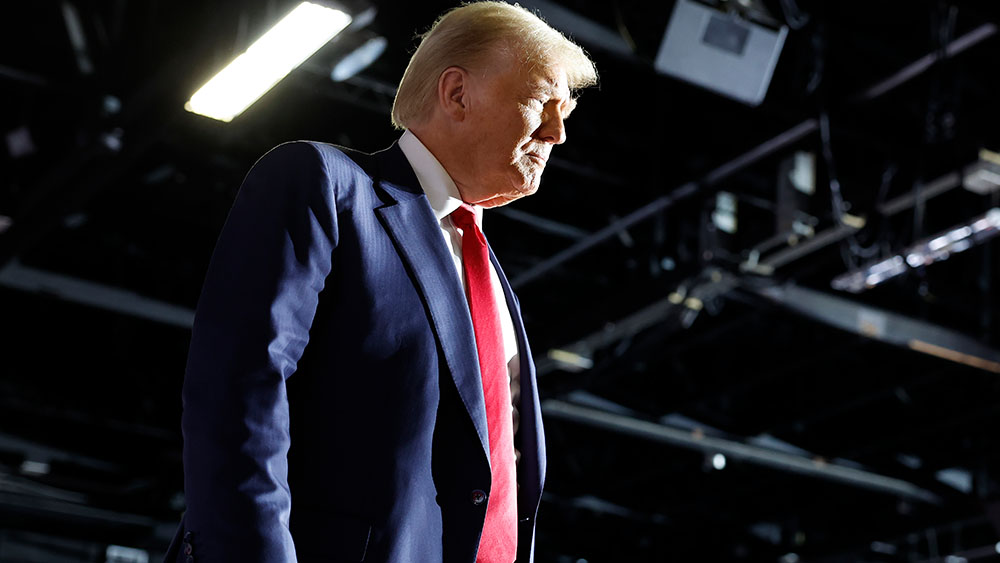Trump to sign executive order designating cryptocurrency as a national priority on inauguration day
01/19/2025 / By Ava Grace

- President-elect Donald Trump plans to sign an executive order designating cryptocurrency as a national priority.
- The order aims to establish a crypto advisory council to foster collaboration between key industry players and federal regulators.
- The executive order also includes the creation of a national Bitcoin reserve to leverage the government’s existing $20 billion stockpile in seized Bitcoin and exploring its use as a hedge against inflation and national debt.
- The crypto market reacted positively, with Bitcoin surpassing $103,000 and stocks of exchange operators like Coinbase and Robinhood rising, reflecting optimism about the industry’s future under Trump’s pro-crypto agenda.
President-elect Donald Trump is planning to sign an executive order designating cryptocurrency as a national priority, signaling a seismic shift in how the federal government approaches digital assets.
This executive order, expected to be one of Trump’s first acts upon returning to the White House, would direct regulatory agencies to collaborate with the crypto industry and establish a dedicated council to advocate for the sector’s policy goals.
The move is meant to fulfill one of Trump’s campaign promises to make the U.S. the “crypto capital” of the world. (Related: Trump administration poised to overhaul crypto regulations with new SEC leadership.)
At its core, this executive order represents a stark departure from the administration of President Joe Biden’s approach to cryptocurrency. Under Biden, federal agencies like the Securities and Exchange Commission (SEC) launched over 100 enforcement actions against crypto firms, often targeting smaller projects and exchanges.
Critics argue that this heavy-handed regulatory environment stifled innovation and pushed the industry to seek friendlier jurisdictions overseas.
The President-elect Donald Trump administration is betting big on cryptocurrency
Trump’s plan, however, seeks to reverse this trend. One of his first goals is to create a crypto advisory council that aims to give the crypto industry a direct line to the federal government ant a voice in shaping policies that affect its growth.
Additionally, the order could include directives for government agencies to review their crypto-related policies and potentially freeze ongoing litigation against crypto firms. This could be a game-changer for companies like Ripple Labs, which has been embroiled in a years-long legal battle with the SEC.
One of the most intriguing aspects of the proposed order is the potential creation of a national Bitcoin reserve.
The U.S. government already holds nearly $20 billion worth of Bitcoin, seized in criminal investigations. Trump’s team and Republicans believe Bitcoin should be used as a hedge against inflation and a tool to manage the nation’s debt.
While the idea of a government-backed Bitcoin stockpile is still under discussion, its inclusion in the executive order would send a powerful message about the administration’s commitment to embracing digital assets.
The crypto market has already responded enthusiastically to the news. Bitcoin surged past $103,000 following reports of the impending executive order, and as of press time is nearing the $104,500 mark. Smaller cryptocurrency assets like Litecoin saw even more dramatic gains.
Exchange operators like Coinbase and Robinhood also saw their stock prices rise, reflecting growing optimism about the industry’s future under a Trump presidency.
Watch this warning about how Trump’s economic plan may be the only way to prevent a massive economic collapse.
This video is from the InfoWars channel on Brighteon.com.
More related stories:
Bitcoin surges to just under $90,000 in value as second Trump term excites crypto markets.
Crypto exchange giant Binance accused of seizing crypto funds of Palestinians at the behest of IDF.
Bitcoin a THREAT to America’s DEEP STATE; Space Force head calls for exploration of blockchain tech.
Why Trump must end capital gains tax on Bitcoin.
Sources include:
Submit a correction >>
Tagged Under:
big government, bitcoin, bitcoin reserve, crypto cult, cryptocurrency, currency reset, digital currency, Donald Trump, economics, economy, executive order, national reserve, national security, politics, SEC, Securities and Exchange Commission, strategic reserve
This article may contain statements that reflect the opinion of the author
RECENT NEWS & ARTICLES
COPYRIGHT © 2017 FUTURETECH.NEWS
All content posted on this site is protected under Free Speech. FutureTech.news is not responsible for content written by contributing authors. The information on this site is provided for educational and entertainment purposes only. It is not intended as a substitute for professional advice of any kind. FutureTech.news assumes no responsibility for the use or misuse of this material. All trademarks, registered trademarks and service marks mentioned on this site are the property of their respective owners.


















